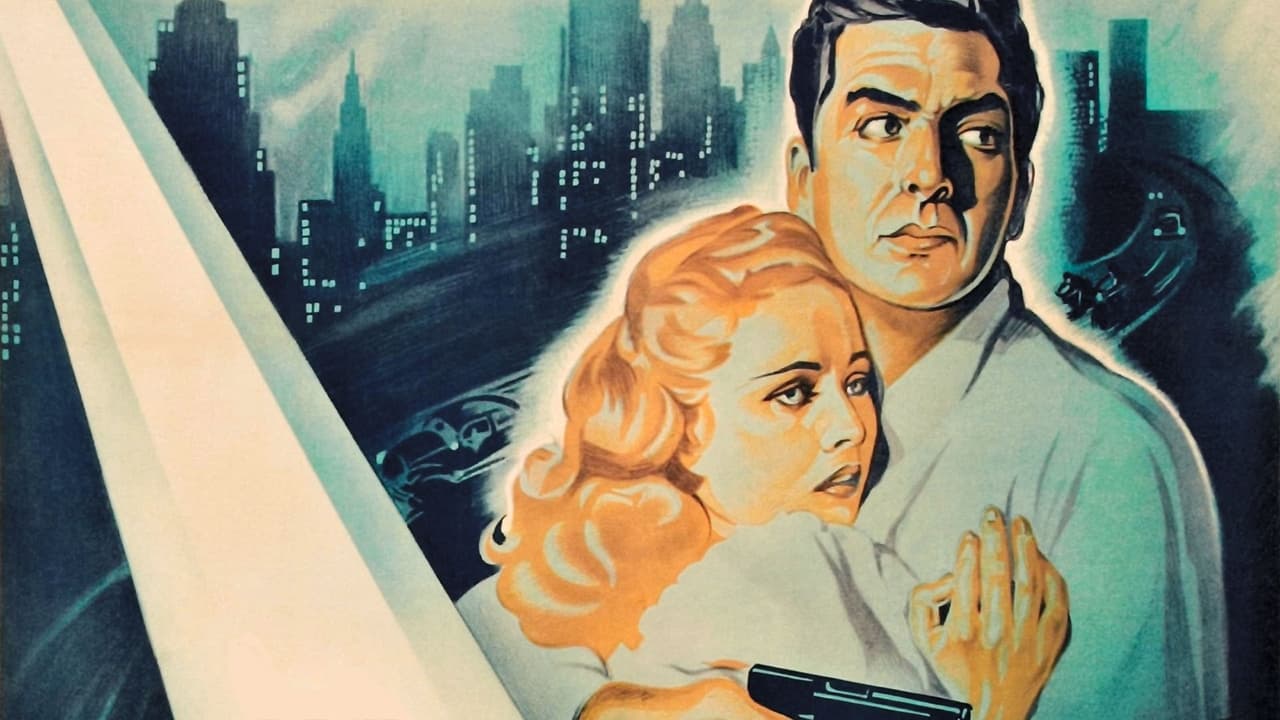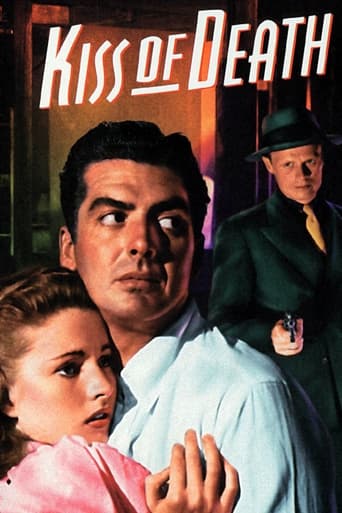

Wow! What a bizarre film! Unfortunately the few funny moments there were were quite overshadowed by it's completely weird and random vibe throughout.
... View MoreAt first rather annoying in its heavy emphasis on reenactments, this movie ultimately proves fascinating, simply because the complicated, highly dramatic tale it tells still almost defies belief.
... View MoreThe movie's not perfect, but it sticks the landing of its message. It was engaging - thrilling at times - and I personally thought it was a great time.
... View MoreBy the time the dramatic fireworks start popping off, each one feels earned.
... View MoreFilm noir became one of the primary genres in cinema in the 1940s: lowlifes, corruption, femmes fatales, and the like. One of the most famous examples is Henry Hathaway's Academy Award-nominated "Kiss of Death". Probably its most famous quality is Richard Widmark's chilling performance as the villain, constantly bearing his teeth like the old man in "Poltergeist 2". The most famous scene is the one on the staircase. It must've been shocking for the time. Victor Mature's protagonist is the typical man who's had a string of bad luck and has no choice but to turn to crime. Trying to make right, his past comes back to haunt him.It makes sense that film noir arose around the time that it became more common to film on location: it affirmed a sense of realism (and cynicism). "Kiss of Death"'s New York setting shows the grittiest aspects of the criminal underworld, as well as law enforcement. Obviously it wasn't as gritty as would be allowed in a few decades, but there's no sugar-coating anything here. As for the ending, it would've been interesting to see it go a different way, but we can still say that Nick achieved his goal.Anyway, an outstanding movie. This is everything that a movie should be. Coleen Gray, Brian Donlevy and Karl Malden offer fine support.
... View More'm a fan of film noir like any other, but sometimes noir still manages to seethe into the darkest recesses of your soul and create a fearful world that's just a little hard to watch. This great little movie from 1947 features one of the most stunningly fearful monsters in all of cinema, Mr. Tommy Udo, psychopathic gangster that laughs like a hyena and glares like a demon from hell, foiled by our hero Mr. Nick Bianco, a down-on-his-luck ol' guy just trying to make ends meet in a life of crime and ending up nearly losing everything. Once Nick starts rebuilding his life, he ends up on the wrong side of Tommy, and then you're talking tension even much more famous noir didn't quite build up.For it's time, this is an extremely violent movie. For these times, it's still an extremely violent movie. There isn't quite as much of the whole "off-screen violence" thing that most movies of this era used to imply rather than show violence, in order to fit the production code. No, one scene in particular stands out a something more demented than you'd see in a Tarantino flick. The way the movie gets away with it, it seems, is that it has a very strong ethical fiber balancing the majority of the drama, and the nihilistic evil of Udo (seriously the 1940s version of Heath Ledger's Joker) is directly confronted by the everyman hero of Nick, who really is a sweety with his heart set in the right place. The voice-over narration too helps add gauze to the pain, especially with the not-quite-earned happy moralistic statement at the end. This movie would be yet another example of the genre where simply eliminated the voice-over narration would make a stunningly perfect movie, but we have what we have and it's some skillful storytelling despite itself.Calling it noir, as well, is a little iffy. It has the high-contrast lighting and the criminal underground ambiance, but the plot-structure is closer to melodrama and the social anxieties are relieved via sacrifice, getting the girl, and happy ending. However, in all other respects its a surprisingly formal early work in the genre that honestly stands out as one of the greatest examples of the form.--PolarisDiB
... View More"Kiss Of Death" is a tense crime drama which tells the story of a criminal whose main preoccupations and motivations centre on his family. The plot is unveiled in a style which utilises both neo-realist and expressionist elements and the many scenes filmed on location in the actual places referred to in the story are very effective and contribute strongly to the authenticity of the events depicted. The original story was based on actual events and was written by Eleazar Lipsky who himself had previously been a New York Assistant District Attorney. The use of a documentary style to deliver a very human story could've been regarded as incongruous but this potential problem was avoided by using a sympathetic narration by Coleen Gray."Kiss Of Death" is notable for the fact that it provided Richard Widmark with his sensational screen debut which was so successful that it almost immediately elevated him to star status and won him a nomination for an Academy Award for Best Actor in a Supporting Role. Eleazar Lipsky was also nominated for an Academy Award for Best Writing, Original Story.After carrying out a jewellery robbery, Nick Bianco (Victor Mature) is caught by the police as he tries to make his getaway. Assistant DA Louis D'Angelo (Brian Donlevy) encourages him to inform on his three accomplices who had successfully escaped from the crime scene, in exchange for a reduced sentence. Nick has a wife and two daughters but being confident that they would be looked after by his lawyer and accomplices when he is in prison, refuses to co-operate.Three years later, after his wife commits suicide and his daughters are placed in an orphanage, Nick is visited by Nettie (Coleen Gray) who used to be his girls' babysitter. She tells him that his wife had been attacked by one of his gang, Pete Rizzo and this provokes him into offering the Assistant DA all the information he had previously withheld. Due to the passage of time since the crime, the offer of a reduced sentence is no longer available but Nick does get to visit his girls if he agrees to provide some useful details about another unsolved case. Nick obliges by telling D'Angelo about an earlier robbery he carried out with Rizzo and then goes on to tell his lawyer that Rizzo had been the police's informer.Nick's lawyer, Earl Howser (Taylor Holmes) then contacts hit man Tommy Udo (Richard Widmark) who goes to Rizzo's home and gets angry when he's told by Rizzo's crippled mother that her son isn't in. In his fury, he binds Ma Rizzo up with some cable and despatches her, in her wheelchair, down a flight of stairs, killing her in the process. Nick had known Udo in prison and after meeting him again, gains enough information from him about the murder he'd carried out for D'Angelo to take the case to court. Nick, who by this time is married to Nettie and is settled in a regular job, bravely testifies but the work of a clever mob attorney ensures that Udo is acquitted. This puts Nick in mortal danger and sets the story up for its powerful finale.In the introduction to the movie, it's explained that as an ex-con, Nick had found it impossible to get a job and with Christmas approaching and no money for presents for his wife and children, he took part in the jewellery store robbery. This predicament is something with which most people can immediately empathise and as such provides a compelling start to this fine movie. Equally riveting, are the brilliantly tense sequences, particularly those seen when the gang are making their escape from the crime scene, when Nick waits nervously for Udo to come and hunt him down and also in the run up to the scene in which Nick and Udo have their final confrontation. The murder of Rizzo's mother is incredibly shocking and Udo's insane giggling is chilling.All the acclaim Richard Widmark received for his portrayal of Udo was thoroughly justified and his depiction of this psychopathic, drug fuelled maniac with his trademark giggle and crazy eyes is exceptional. Victor Mature's performance is perfectly understated as it conveys Nick's basic decency and stoicism without ever becoming maudlin or self-pitying. He was a man whose principles as a criminal prevented him from co-operating with the police, however, when a conflict arose between these principles and his family values, the latter took precedence. Coleen Gray is also faultless as the bubbly, good natured Nettie.
... View More"Kiss of Death" is a fairly standard noir drama made memorable by the presence of Richard Widmark as the maniacal gangster Tommy Udo. All the time while watching him though, I kept thinking of Frank Gorshin as The Riddler in the campy 'Batman' TV show of the mid-Sixties. Probably because I was a teenager when 'Batman' came out, and I had already seen Gorshin doing his impression bits on variety shows of the era. It would be interesting to surmise that Gorshin based his Riddler on Widmark's Tommy Udo, but his own explanation removes that possibility.Without Widmark, this story would probably be relegated to 'just another crime drama' status, even though a good performance is turned in by it's principal, Victor Mature, as a criminal attempting to go straight via the 'stoolie' route. His character, Nick Bianco, is portrayed as a caring family man who becomes even more conflicted after his wife commits suicide while he's in the can. That's where he and Tommy first hook up, with their entanglement proceeding on the outside when both are paroled.What makes the picture particularly interesting for me were all the great location street scenes that give the picture it's New York City flavor. Did you ever see such brand spanking new looking taxi cabs as those shown here, courtesy of Yellow Cab and Sky View? Try finding one as classy today and you'll be looking a long time.What you don't want to do while watching is put this film under the microscope for some of the credibility defying moments that creep into the story. There's that tense shadowy scene when Nick Bianco waits for Tommy Udo and his goons to show up at his house, and it turns out to be Assistant D.A. D'Angelo (Brian Donlevy). Then when Nick confronts Tommy at the restaurant, you have to wonder why he made it past the front door. But the question that really nagged me throughout the story was this - why did every hood in the big house always wear a suit and tie?
... View More